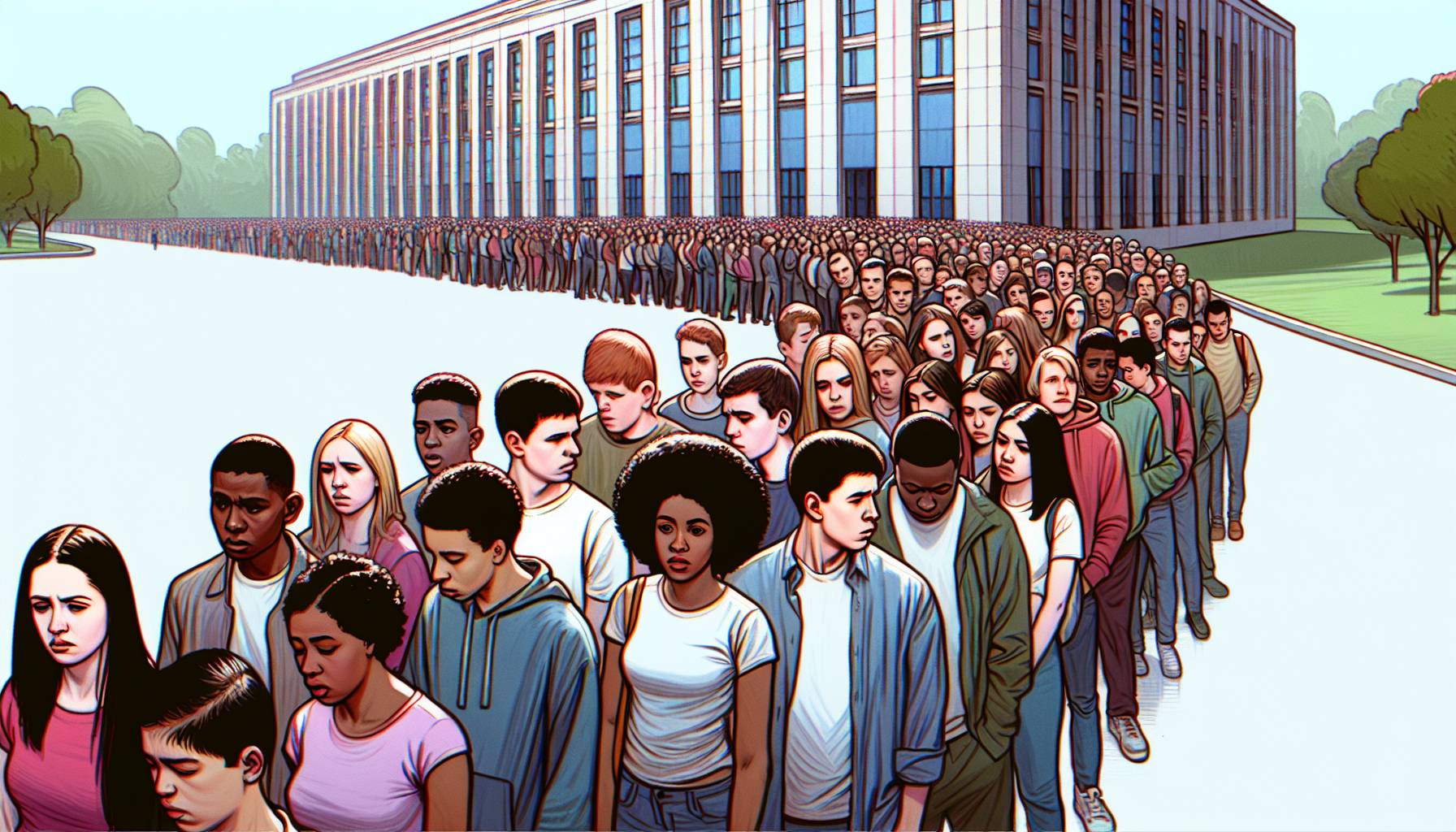Advocate organizations have noted substantial growth in the backlog of mistreated or forsaken young immigrants seeking green cards, with figures more than doubling over the past two years. The recent study carried out by the End SIJS Backlog Coalition and Tulane Law School’s Immigrant Rights Clinic indicates that there are now over 100,000 foreign-born youngsters with “special immigrant juvenile” (SIJ) status approved or pending, a pathway to legal residency, waiting to apply for green cards.
The growing backlog of SIJ applications
This number has increased significantly from nearly 45,000 in 2021. This escalation in the backlog highlights the mounting challenges faced by young immigrants trying to navigate the complex and slow-moving immigration system. Experts argue that the growing backlog can have severe consequences on the lives of these vulnerable youths, as delays in obtaining a green card can hinder access to crucial resources such as education, healthcare, and employment opportunities.
Problems faced by SIJ applicants
Immigrants below 21 years old who have suffered abuse, abandonment, or neglect from a parent may qualify for SIJ status, enabling them to apply for a green card or lawful permanent residence. However, Laila Hlass, co-director of the Immigrant Rights Clinic at Tulane Law, highlights that the system is not operating as planned. On the contrary, these wait times frequently exacerbate the uncertainty in these vulnerable children’s lives. The lengthy application process and bureaucratic hurdles often present additional challenges for young immigrants seeking stability and security in their lives. As a result, immigration advocates are calling for reforms to streamline the SIJ process and provide prompt relief to eligible candidates.
Data revealing the extent of the backlog problem
Based on data from the U.S. Citizenship and Immigration Services, the report reveals that over 107,000 youths from 151 countries are in legal limbo as of March 1 after being granted humanitarian status. This large number of individuals face uncertainty regarding their future in the United States, as they are not allowed to apply for permanent residency until the federal government says there are available immigrant visas. The situation highlights the need for streamlined processes, as well as increased resources for agencies handling such cases, to help provide stability and support for these young people.
Struggles faced by SIJ grantees without green cards
Although these young individuals have been approved for SIJ status, they have not yet received green cards. This holdup further complicates their lives, as they cannot access federal student aid or healthcare programs and are at risk of deportation. The delay in obtaining their green cards leaves them in a state of limbo, unable to fully move forward in their education or work opportunities in the United States. Additionally, this precarious situation creates immense stress and uncertainty for these youths, who are in constant fear of deportation, hindering their ability to fully integrate into society.
Demands for improvement in the SIJ application process
Immigrant rights organizations are demanding that immigration authorities decide SIJS petitions within a 180-day time frame, as mandated by current law so that SIJS youth can obtain work permits and protections from deportation promptly while they wait in the green card backlog. This demand comes in response to concerns about prolonged wait times which often last more than a year, causing undue stress and uncertainty for those seeking safety and stability in a new country, and compounding the wait times of the green card backlog.
Policy recommendations for Congress
Moreover, they are encouraging Congress to implement the necessary measures to assist these young immigrants in obtaining green cards without many years-long delays. Additionally, advocates are urging lawmakers to streamline the application process and eliminate bureaucratic obstacles that may impede these young people’s progress toward legal residency. By doing so, Congress can acknowledge the immense contributions these young immigrants make to American society and help them achieve the stability they deserve.
First Reported on: nbcnews.com
FAQ on the growing backlog of SIJ applications
What is the Special Immigrant Juvenile (SIJ) status?
The SIJ status is a pathway to legal residency for foreign-born youngsters who have suffered abuse, abandonment, or neglect from a parent. This status allows eligible individuals under the age of 21 to apply for SIJS, which when approved allows them to seek a green card or lawful permanent residence in the United States.
How many youths are currently waiting for green cards under the SIJ status?
As of March 1, there are over 107,000 youths from 151 countries who have been granted humanitarian status but are still waiting for their green card applications to be processed, according to data from the U.S. Citizenship and Immigration Services.
What challenges do young immigrants face due to the backlog of SIJ applications?
Delays in obtaining green cards can hinder access to crucial resources such as education, healthcare, and employment opportunities for these vulnerable youths. Additionally, the lengthy application process and bureaucratic hurdles often present challenges for young immigrants seeking stability and security in their lives.
What are immigration advocates demanding to improve the SIJ application process?
Immigrant rights organizations are calling for immigration authorities to decide on cases for immigrants applying for this special status within a 180-day time frame and to fix the backlog so that SIJS youth can apply for green cards after the SIJS petitions are approved. They argue that a more efficient timeline is crucial in ensuring a fair process and providing necessary support for immigrants adjusting to their new lives.
What policy recommendations have been made to Congress regarding the SIJ application process?
Advocates encourage Congress to implement measures to assist these young immigrants in obtaining green cards without lengthy delays. They also urge lawmakers to streamline the application process and eliminate bureaucratic obstacles that may impede immigrants’ progress toward legal residency, acknowledging their immense contributions to American society and helping them achieve the stability they deserve.













